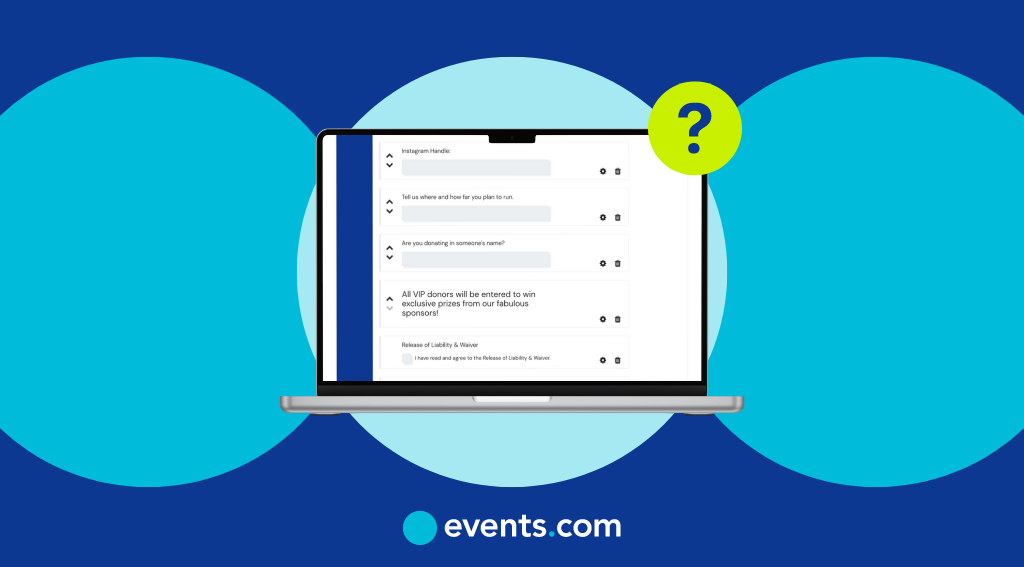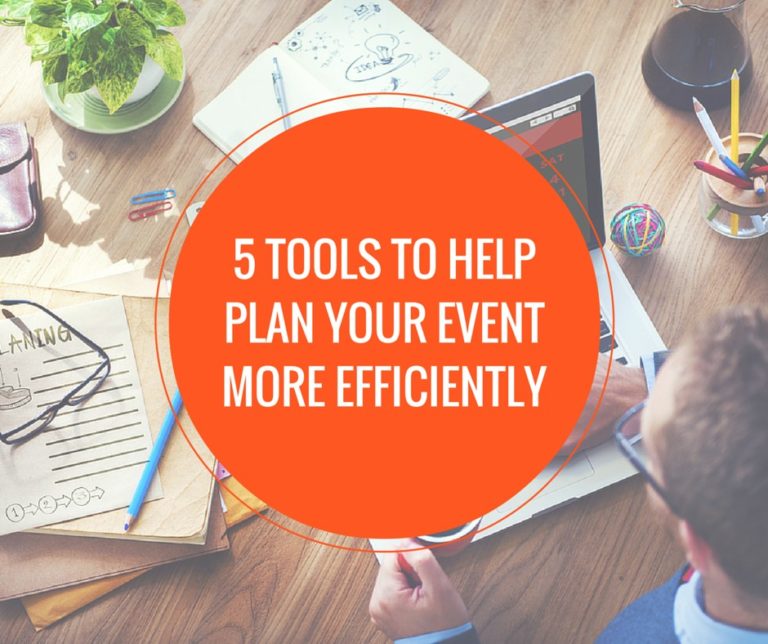One of your jobs as an event organizer is to gather relevant information about your future and current attendees and the best way to gather that information is through event registration forms. Your event registration form will be the first interaction you’ll have with your attendees. Use this form to gather important information and to sell your event. While it can be tempting to overload your registration form with information and questions, overloading can do more harm than good. You don’t want to scare away your attendees by asking too many questions, nor do you want to give away everything that your event has to offer, thus doing away with surprises.
So, what kind of event registration questions should you and other event organizers be asking and why is it important? Let’s find out.
The Importance of Gathering Information From Attendees
What does it matter if you have information about your attendees? Who cares as long as they register and show up, right? Wrong! Having information is vital to the success of your event and giving your attendees a positive event experience. It’s not just about your attendee satisfaction, though. It’s also about you and your brand and giving a positive first impression to new guests. How? Because you’re asking them relevant questions and then implementing their answers into your event. For example, if you have attendees who have an intolerance to gluten, offering foods that are gluten-free will show them how much you care and will keep them healthy and happy at your event.
But event registration form questions go beyond just food preferences. It’s the perfect time to gather contact info, payment options, special accommodation requests, and more.
Okay, so, where does your event registration form go? Well, that’s one purpose of an event landing page! Place the form front and center on your page and you’ll be converting your prospective attendees in no time. But don’t forget, there’s a difference between registration and tickets, so you’ll need to consider that, too, when planning your landing page.
10 Types of Event Registration Questions You Should Ask and Why
Now that you know where to put your online registration forms and why it’s important to have one with relevant questions, let’s figure out what questions you should be asking and why. The following 10 event registration questions will help you create an event registration strategy and their event registration examples will give you a great place to start, but feel free to make it your own, too.
1. Privacy Policy and Waivers Questions
First up, privacy policy and waivers. You want your event to be secure and safe. Your attendees want that, too. With all the privacy concerns nowadays, it’s more vital than ever to include privacy policy and waiver questions in your registration forms for events. Sample event registration questions to ask here are “Do you agree to our event’s privacy policy?” and “Are you willing to sign a waiver for participation?”
Include a link to your event’s privacy policy, which details how attendees’ personal information will be used and stored. Showing this information up front and asking your attendees to agree to your privacy policy shows that you’re transparent and builds trust. Including questions and information about privacy policies is required legally in some places, so it’s a good idea to include that information anyway to avoid penalties.
As for the waiver, you’ll need this, especially if your event involves physical activities and potential risks, that way you can make sure everyone understands and agrees to any risks or responsibilities within your event.
2. Basic Personal Information Questions
Asking for basic personal information should be obvious — it helps you identify and communicate with your attendees, provide a personalized event day and post-event experience, and streamline the check-in process. Using basic personal information can also help you in stopping uninvited guests from attending your event and causing mayhem.
Knowing your attendees’ full names allows you to address them and create personalized experiences. Plus, it helps keep your event organized.
Gender and location let you know and understand your audience better and customize event offerings to suit their interests and preferences. Gender also helps you know how to address someone and what pronouns they may use. So be sure to include different pronoun types, or even the option to enter customizable ones.
Knowing your attendees’ ages can help you create content based on age demographics. It’ll also help you determine if there are any age restrictions involved. For example, if you know that you have a predominantly 22+ age group, you can plan on offering alcoholic beverages.
Also, be sure to get any emergency contact info just to be safe.
3. Attendee Contact Information Questions
You’ll need to gather contact information if you want to communicate with your guests before, during, and after your event. Ask for their email addresses, phone numbers, and mailing addresses, and also ask what method of communication they prefer. Not everyone may be okay with giving out their phone number or mailing address, so it’s important that you ask for email addresses, too. Once you have this information collected, it’s time to start operation communication!
Use email addresses to end important event info — things like event confirmations, updates, and info about upcoming events. You’ll also need your attendees’ email addresses to send post-event follow-ups with thank-you notes, event recaps, and feedback surveys.
Phone numbers are great for sending urgent updates or reaching out to attendees who may not check their email as often. But be careful with phone communication! Not everyone likes to talk on the phone, so don’t pester your attendees by calling. Instead, send a text message but be careful here, too. You don’t want to harass them, so it’s important to keep in mind the best practices for sending texts.
Need to send physical items? Then you need to inquire about mailing addresses.
Collecting personal information also helps build a database for future events and marketing. The end result? A loyal audience you can connect with time and time again.
4. Social Media Profile Questions
Social media is popular and there are so many platforms to choose from. Don’t guess where your audience is. Ask them! Social media registration questions examples include “Which social media platforms do you use the most?” to find out important information about your attendees’ online behavior and preferences. Once you know where your attendees like to spend their time, you can start spending your time there, too.
Then you can start providing your attendees with event updates, personalized content, and more. You can talk to them and answer their questions easily. Your event attendees may share your content across their socials, which will increase your visibility and the reach of your event. It’s a win/win!
5. Special Accommodations Questions
No two people are the same, and some may require special accommodations. When you accommodate your guests and consider what they need to have a positive experience, you show them that you care and you create an inclusive experience for all attendees.
The question, “Do you require any accessibility accommodations?” is a great place to start. Whether it’s translation or caption services, wheelchair accessibility, or speech or visual options, it’s important to include these options in your event for those who need them. That way, all your attendees can participate and enjoy your event without worry.
6. Dietary Preference Questions
Just like with special accommodations, food preferences and restrictions are also great to know about! Include vegetarian, vegan, gluten-free, and food allergies questions or other specific dietary requirements and needs.
When you arm yourself with this information, you can plan your menus around the specific dietary needs of your guests, which will allow your attendees to enjoy your provided meals without worrying about upsetting their stomachs or worse. You’ll avoid your attendees experiencing issues or discomfort and having a negative experience or having to leave your event early.
7. Session Preference Questions
You want your attendees to enjoy their time at your event and leave with a positive experience, right? So, that’s where session preferences come in handy! Understanding what your attendees want out of your event’s sessions will help you create an agenda that appeals to their interests and maximizes engagement. Ask questions like, “What are some workshop topics you’d be interested in?” and “What keynote speakers are you excited to hear from?” Then you can create your event schedule to meet your audience’s needs.
But that’s not all — tailoring these sessions to your attendee’s expectations will help you allocate resources and show that you’re committed to giving your guests a personalized experience.
8. Swag Preference Questions
Who doesn’t love swag or merchandise that represents a place you’ve been or a brand you love? Still, not every form of swag will appeal to everyone. That’s why it’s important to ask your attendees about their swag preferences. “What type of merch do you like?” or “What designs and colors are your favorite?” are both great questions to ask.
With this information, you’ll be better able to make informed decisions about your promotional items. Instead of selling (or giving away) merch that ends up unused or thrown in the trash, you can focus on offering swag that appeals to your audience. Consider their interests and lifestyles and then figure out how you can offer swag that aligns with those.
9. Payment Related Questions
Payment can be a tricky subject. Not everyone is comfortable sharing their debit or credit card information, even over secured platforms. So make sure to offer different payment methods, like PayPal, and address any concerns that might come up. Ask your attendees questions like, “What payment options would you like to use during the event?” and “Would you like invoices with your purchases?”
Also, consider offering payment arrangements through programs like Klarna or Affirm, that way your event caters to all budget times and flexibilities.
10. Open Questions To Provide Additional Information
Don’t forget to ask open-ended questions that can encourage your attendees to share their thoughts and concerns. Questions may include, “Can you tell us more about yourself?”, “What are you hoping to get out of this event?”, or “Do you have any concerns you’d like to share?”
Open-ended questions are a goldmine of information, allowing your attendees to express their thoughts, concerns, and questions without hesitation. These questions are engaging and inclusive and will be your catalyst for addressing problems and improving attendee satisfaction.
Streamline Your Event Registration Process With Events.com
We get it — there’s a lot of information to take in and apply to your event participation form. But don’t worry—you don’t have to do all of this on your own. Events.com can help with your event planning process! With Events.com event management platform, you’ll have everything you need to propel your event forward.
From setting up your registration or ticketing page to finding sponsors and generating reports, Events.com can help you with your event from start to finish, including help with online event registration forms. We offer streamlined event management, user-friendly experiences, tailored solutions, and dedicated support to help you when you need it.
Try our demo today, and experience ease and efficiency in your event management.




